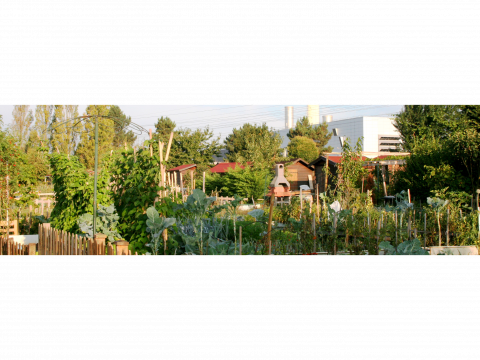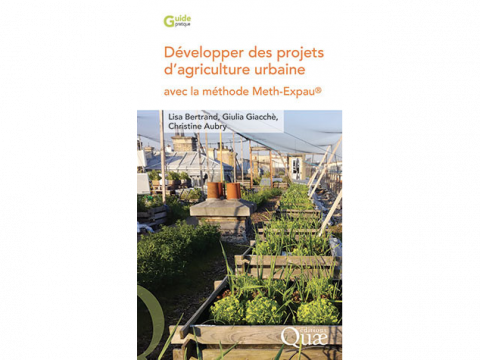
Developing Urban Agriculture Projects Using the Meth-EXPAU Method
June 30 2022Based on several years of action research and support from urban stakeholders to design agricultural projects, this guide offers a methodological pathway for designing and implementing an urban agriculture project in a territory. Intended for landowners and managers wishing to develop urban agriculture projects, the publication provides step-by-step guidance for both commercial (urban farms, eco-grazing) and non-commercial projects (community gardens, chicken coops, etc.).
Numerous urban planning stakeholders—local governments, public housing authorities, promoters—are looking to undertake urban agriculture projects, which are emerging as a driver for the ecological transition of cities and a tool for teaching about sustainable food. Urban agriculture comes in a wide range of forms, technical systems, and economic models, such as indoor or outdoor intra-urban farms, multi-purpose or more production-oriented micro-farms, community gardens, vegetable farming, mushroom growing, beehives, eco-grazing, raising small animals, urban orchards, and multiple types of edible landscapes. The implementation of these projects has raised many questions about their relevance and feasibility in the areas concerned.
What are the expectations of stakeholders and inhabitants? What types of projects can be undertaken? How much space is required? How can community gardens or micro-farms be put in place?

The Meth-EXPAU® method is based on the principle that urban agriculture projects cannot be duplicated from one territory to another. Local features not only help assess the feasibility of an agricultural project, but also to imagine improvements that are aligned with emerging territorial demands and complement existing agricultural sites in the urban and peri-urban landscape. The methodological approach involves 3 stages:
-
a territorial analysis, which involves taking stock of tangible and intangible resources and local stakeholders to reveal existing dynamics as a way of identifying difficulties and opportunities when defining action plans.
-
defining a range of possibilities, which involves deciding which projects are the most relevant and adapted to the territory by comparing the outcomes of the territorial analysis with the main forms of urban agriculture. In this guide, these forms are described according to three categories: production-oriented commercial urban agriculture, service-based commercial urban agriculture, and non-commercial urban agriculture.
-
implementing the project and procedures that will be followed. Depending on the form chosen, operational guidelines are proposed to help further the completion of the urban agriculture projects in question.
The guide to implementing the Meth-EXPAU® method is intended for urban landowners and property managers looking to launch urban agriculture projects for both commercial (urban farms, eco-grazing) and non-commercial projects (community gardens, chicken coops, etc.). Even without specific knowledge in these fields, this guide provides users with step-by-step guidance.
References: Bertrand L., Giacchè G., Aubry C., 2022. Developing Urban Agriculture Projects Using the Meth-EXPAU® Method, Versailles, Quae, 82 p. (Guide Pratique collection).
About the Authors
 |
Lisa Bertrand specializes in developing, monitoring, and assessing urban agriculture projects. Since 2019, she has been a project manager at the Exp’AU Urban Agriculture Consulting Office (AgroParisTech Innovation). |
 |
Giulia Giacchè is an agronomist with a Ph.D. in Land Management. She has participated in several research projects on urban agriculture in Brazil, France, and Italy. Since 2017, she has served as the Exp’AU’s coordinator, offering support to local governments and private stakeholders working to implement urban agricultural projects. |
 |
Christine Aubry is a professor at AgroParisTech and an agricultural engineer at INRAE. She plays an active role in structuring research on urban agriculture in France, and heads AgroParisTech’s Urban Agriculture partnership chair. She has served as Expo’AU’s scientific director since its creation in 2015. |
Find out more
The Meth-EXPAU® method is derived from the experience of the EXP’AU Urban Agriculture Consulting Office, created in 2015 by the “Urban Agriculture” research team at the SADAPT (Science for Action and Development – Activities, Products, Territories, AgroParisTech/INRAE/Paris-Saclay University) Joint Research Unit as a response to the many requests for support from local governments and project leaders. EXP’AU’s core expertise is centered around decision-making support for the implementation of urban agriculture projects, with a focus on jointly developing tools and methodologies with its partners so they can become autonomous when moving forward with future projects. Through its support, EXP’AU aims to encourage exchanges between researchers and society and stimulate the team’s thinking and production of knowledge on urban agriculture.
Over the past seven years, EXP’AU has supported more than twenty municipalities of varying sizes in different geographical areas—half of which are in the Greater Paris region—along with promoters, developers, and public housing authorities. Its guidance, made available via a research service contract, is provided by junior consultants from AgroParisTech programs who receive scientific and methodological support from research team members, thereby acquiring their first professional experience.
EXP’AU currently operates under the umbrella of AgroParisTech Innovation, and is coordinated by Giulia Giacchè, an agronomist specialized in land management. Christine Aubry, an agronomist, and Véronique Saint Gés, an economist in the “Urban Agriculture” research team at the SADAPT (AgroParisTech/INRAE/Paris-Saclay University) Joint Research Unit, serve as its scientific directors.
AgroParisTech and INRAE registered the Meth-EXPAU® trademark with the French Patent and Trademark Office (INPI) in 2019. The guide to implementing the Meth-EXPAU® method was made possible through financial support from INRAE for a pre-maturation project launched in 2020. It was presented to local government officials from the Greater Paris Metropolitan Area in June 2022.
A digital supplement to the guide is being developed.

